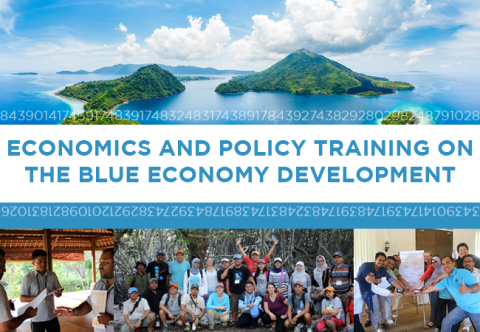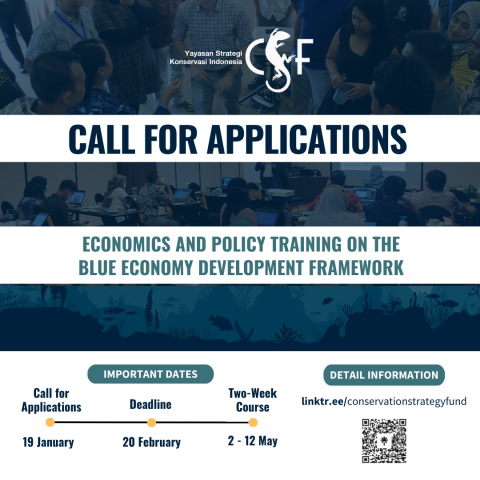
ECONOMICS AND POLICY TRAINING ON THE BLUE ECONOMY DEVELOPMENT FRAMEWORK
ABOUT THE COURSE
Yayasan Strategi Konservasi Indonesia (CSF Indonesia) is now accepting applications for our two-week intensive course: Economics and Policy Training on the Blue Economy Development Framework. This course will be held in person from May 2-12, 2023 in Kendari City, Southeast Sulawesi for participants across Indonesia.
During this course, participants will be introduced to key elements of economic and quantitative tools for economic analyses, as well as practical tools for governance and policy design. Topics will include an introduction to economics, microeconomics, macroeconomics, natural resource economics, quantitative economic analysis, fisheries economics, conservation economics, impact evaluation, ecosystem service valuation, cost-benefit analysis, and application of system thinking in public policy and governance. All of these areas of study will be linked to practical real-world applications for the blue economy implementation and development framework in Indonesia.
The cost of course tuition, meals, and lodging during the course is being provided thanks to generous grants from the David and Lucile Packard Foundation.
THE SELECTED PARTICIPANTS:
1. Kheysia Abigail Makhas
2. Danang Pramudita
3. Fatimatuz Zahro Diah Putri
4. Irdam Riani
5. Hardin Gamara
6. Fachry Abdul Razak Afifi
7. Lugas Lukmanul Hakim
8. Farok Afero
9. Hendriyadi Bahtiar Daeng
10. Derry Wanta
11. Eveline Kurniati
12. Aulia Rahman
13. Irianes Gozali
14. Widyaningsih Peni Lestari
15. Rahvania Salsabila
16. Rafika Farah Maulia
17. Yeyen Mardyani
18. Ni Made Sukartini
19. Teddy Asril
20. Yuyun Aggraini
We would like to congratulate all the selected participants for our two-week intensive course: Economics and Policy Training on the Blue Economy Development Framework.
Please send us your 'Participation Confirmation' no later than March 30th, 2023 through E-mail with the subject "2023 TWC Participation Confirmation" to [email protected].
APPROACH:
The training will focus on teaching the participants on key elements of economics and quantitative tools for economic analyses. Some governance perspectives will also be introduced to better equip participants for using economics in policy analyses and design.
a. Basic Economics (30%).
This element focuses on strengthening the participants’ knowledge of microeconomics, macroeconomics, and development economics to better understand various fishery policy and business decision-making processes.
b. Natural Resources Economics with emphasis on marine resource and fishery economics (30%).
This element also focuses on how to link theory to the realities of conservation and sustainable development and the practical needs of adult professionals.
c. Quantitative economic analysis tools (20%)
This element will focus on cost-benefit analysis, valuation, policy and governance
d. Policy and Governance (20%)
Through some lectures, games, and policy laboratory/exercises, course participants will learn fishery policy and governance issues in Indonesia’s context.
The sessions will be distributed in a two-week program, with four sessions for each day: two in the morning, and two in the afternoon. Evening sessions will informally be used for discussion, fire talks by external resource persons, readings, and exercises. A field trip is planned to connect materials learned in the classroom with real-life fishery practices. Advanced English skill is required.
There will be an orientation held over Zoom with all course participants one week prior to the start of the course to provide an overview of the course format, mechanisms, and supporting platforms.
BENEFITS
CSF course participants experience a transformational shift in the way they approach their work, and our alumni are already using what they have learned in the field to make stronger economic arguments for sustainable fisheries management and marine conservation. Participants will gain the theoretical and working knowledge they need to better design and evaluate marine fisheries resource programs and policies. In addition, participants will be able to use economic tools and insights in their work to make the case for sustainable development and fisheries management strategies. Past participants include policy advisors, conservation practitioners, and natural resource managers.
INSTRUCTORS
The course will be taught by instructors from CSF staff, international economic experts, leading academics at international universities such as the University of Wisconsin-Madison, as well as professors from Indonesia’s leading universities such as IPB University, Indonesia University, Gadjah Mada University, and researchers from the Ministry of Marine Affairs and Fisheries, and National Agency for Research and Innovation. Our expert instructors for this year’s course include Mubariq Ahmad, David Johnson, Alin Halimatusadiah, Christy Desta Pratama, Kim Bonine, Rimawan Pradiptyo, Luky Adrianto, Umi Muawanah, and many others.
|
|
|
|
|
|
|
|
|
|
|
|
|
|
|
|
|
|
|
|
|
|
|
|
|
|
|
|
|
|
|
|
|
ELIGIBILITY
The course is for Indonesian students and professionals working with government institutions or in other relevant fields, who are interested in how economics and governance can improve the overall sustainability of fisheries and marine conservation management throughout Indonesia. Areas of interest include, but are not limited to: (i) Government agencies, (ii) Researchers, (iii) Academics, (iv) the Private Sector, and (v) Civil Society Organizations. 30 participants will be selected in total from the applicants to this training program through a competitive application process.
APPLICATION AND SELECTION
Economics and Policy Training on the Blue Economy Development Framework will be held from May 2-12, 2023. The deadline for applications is February 20, 2023. Selection will be based on several criteria including, but not limited to: previous work experience in the fisheries and marine sector in Indonesia, relevant work experience in conservation, economics, development, or a similar field, eagerness to learn, commitment to attend all the sessions throughout the course, and English language proficiency.
Those who are interested should fill out the application form here or download the form here and send it to [email protected] by February 20, 2023 - 23:59 WIB.
Come and join us!
Bogor Agricultural University, Faculty of Fisheries and Marine Sciences (FPIK-IPB)
CSF and FPIK-IPB work together to promote mutual research cooperation and develop scientific capabilities in the fields of marine studies and fisheries sciences in Indonesia. Research focuses on developing methods & techniques for marine and fisheries resources management, marine and fisheries ecosystem valuation, marine policy and governance, and socio-economic instruments for developing marine and fisheries sectors in the Indonesian Fisheries Management Region.




